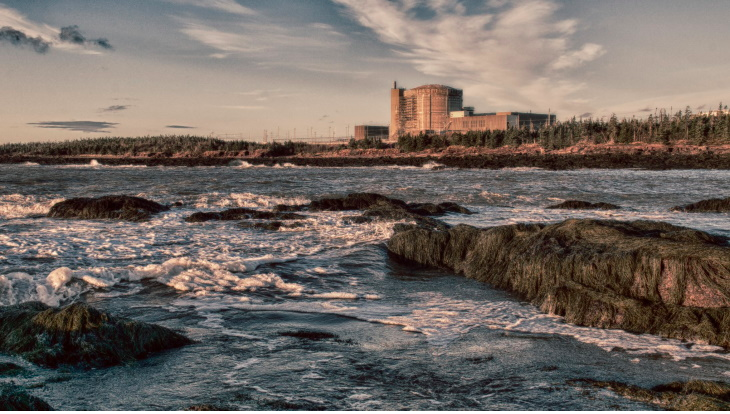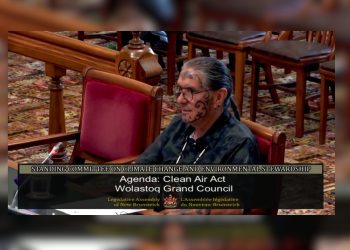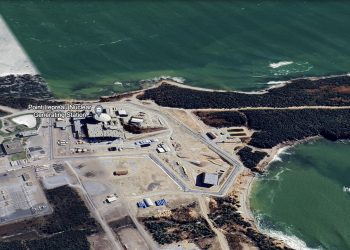Groups participating in the recent hearing to extend the operating licence of the Lepreau nuclear reactor on the Bay of Fundy say the decision on June 22 to grant a 10-year licence further erodes public trust in Canada’s nuclear regulator, the Canadian Nuclear Safety Commission (CNSC).
The previous five-year licence expired at the end of June. During the life of the nuclear plant, the average licence length was less than three years.
The Coalition for Responsible Energy Development in New Brunswick (CRED-NB) and the Canadian Environmental Law Association (CELA) released a statement claiming that a longer licence period is a blatant attempt to reduce community engagement and involvement, and that shorter licences and more frequent hearings would have better served the public interest.
The CNSC made its announcement the day after National Indigenous Peoples Day. During the licence hearings in May, Indigenous groups in New Brunswick said that NB Power’s request for a 25-year operating licence disrespects the rights of Indigenous people to care for the land in their unceded territory. The CNSC ultimately approved only a 10-year licence, but this licence length is still more than three times the average licence length for Lepreau.
The licence approval ignores the multiple requests of the Peskotomuhkati Nation on whose territory the Lepreau nuclear reactor sits. During the hearings, Indigenous intervenors said their main opposition to the licence renewal was the Lepreau reactor’s legacy of radioactive waste.
The Peskotomuhkati want NB Power to wind down operations at Lepreau long before its scheduled 2040 shutdown and instead develop renewable energy and storage technologies that will not produce toxic waste lasting hundreds of thousands of years.
The May hearing was only the latest occasion that Peskotomuhkati Chief Hugh Akagi let his concerns be known about the storage of nuclear waste on his peoples’ territory, as he has made this clear several times in the past. Yet neither NB Power, the CNSC, nor the Canadian government has undertaken to seek consent from the Peskotomuhkati Nation to store hazardous wastes or negotiate an agreement about the storage of hazardous wastes on this land.
Canada recently embraced the UN Declaration on the Rights of Indigenous Peoples. Article 29 of the Declaration requires States to take effective measures to ensure that no storage or disposal of hazardous materials takes place in the lands or territories of Indigenous peoples without their free, prior, and informed consent. The CNSC decision does not reflect this commitment.
“The new licence gives NB Power the ability to create and store 10 more years of fresh and dangerous high-level waste on our territory. This is not acceptable,” Chief Akagi said. “Though we do believe we had some influence on the decision, given that NB Power’s request was for a 25-year licence, our efforts did not result in Canada meeting its own legal and related obligations to the Nation. We should not be put in the position of having to point this out.”
At the hearing, CNSC Commissioner Kaghee asked both NB Power and the CNSC staff how a 25-year licence would advance reconciliation. Chief Akagi later explained, “Reconciliation is complex, but it is partially about giving things back. They’ve taken the beauty of the land, they’ve taken the health of the area, and they are returning thousands of years of nuclear waste. It is not a fair exchange. Not only is this disrespectful of the spirit of reconciliation, but it also works to destroy the progress we’ve made thus far.”
In reaction to the decision, Chief Akagi stated, “I was pleasantly surprised that the license did not extend to 25 years, I feel that our statements may have had a small influence. However, I also recognize that the decision violates many of Canada’s commitments, and sadly, this does not surprise me. Though we are all learning how to be in relationship with one another theoretically – unfortunately, these learnings are not yet being put into practice.”
The events of the past 11 years – including the recent military attack on a nuclear plant in the Ukraine and the Fukushima Daiichi accident in 2011 – demonstrate that our understanding of the dangers of nuclear power plants and the substantial risk they pose to human health, safety and the environment are continuously evolving.
The public is also concerned about NB Power’s plans to build two types of experimental “small modular nuclear reactors” (SMRs) on the Lepreau site within the next 10 years.
“This longer license ignores that SMRs could present new risks, and does not commit NB Power to a new public hearing to maintain its license as these new risks are added to the site”, said Gail Wylie, spokesperson for CRED-NB.
The CNSC decision stated that it will hold a mid-point meeting no later than 2027, when a comprehensive update will be provided, and public comment will be invited. However, CELA pointed out that a meeting is a discretionary process and not a stand-in for a public hearing. “Regular licence hearings are important for public scrutiny and active public engagement in nuclear oversight,” said CELA counsel Kerrie Blaise. “This engagement can build public trust in NB Power’s operations at the Lepreau nuclear facility and build commitment of staff and management to honour that public trust.”
Kim Reeder, a senior policy analyst with the RAVEN project at the University of New Brunswick, coordinated the CNSC intervention for the Passamaquoddy Recognition Group. Susan O’Donnell, the lead researcher for RAVEN, also participated at the CNSC hearing.










